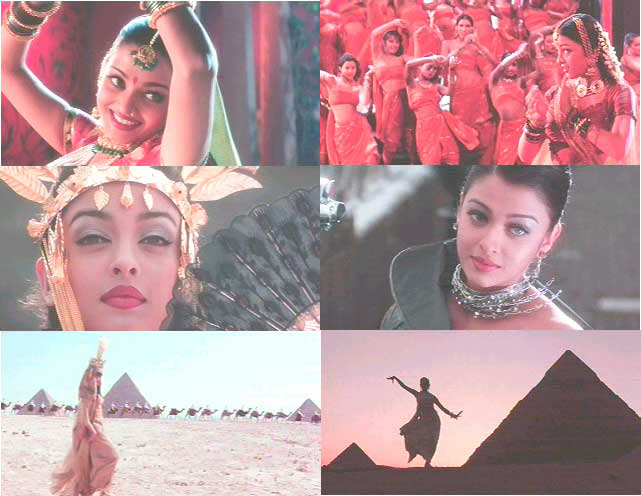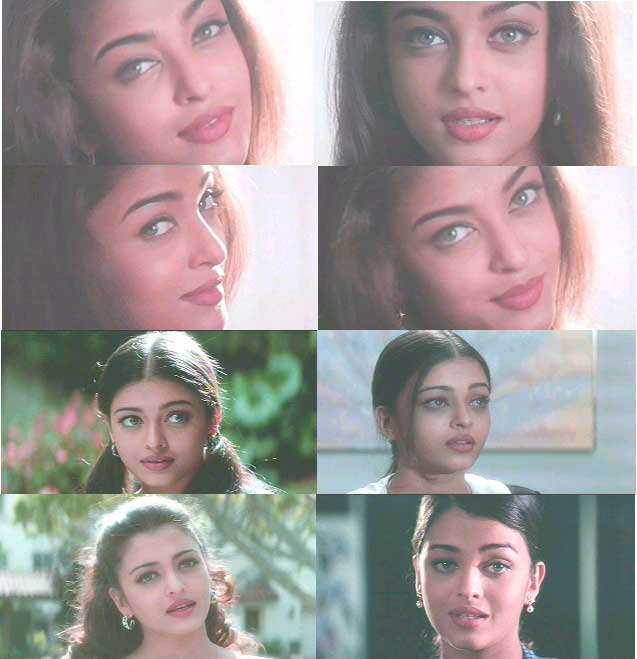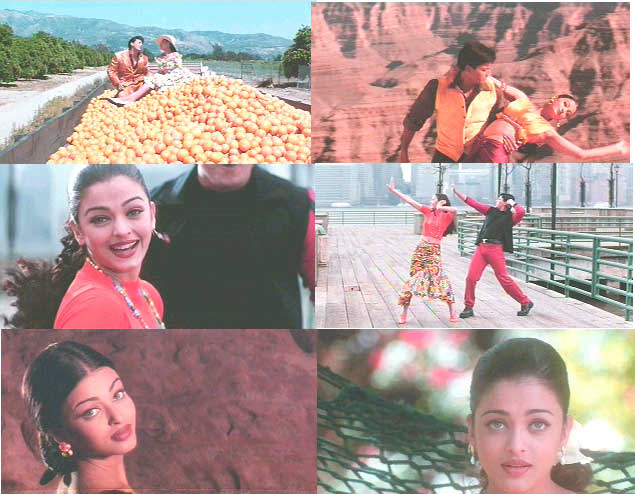Jeans

Director: Shankar
Music: A.R. Rahman, Lyrics: Javed Akhtar
Year: 1998
Running Time: 252 minutes
Jeans is an enjoyable comedy without a lot
of weight or effective melodrama, but this is compensated by its energy, ambitious
musical set pieces and the deep-eyed beauty of Aishwarya Rai. This made it
more than palatable and the movie fled by fairly quickly if innocuously.
The comedy may be as old as cinema has had the technical ability to place
the same actor in the same frame and thus create the effect of twins – but
it still works here to a some degree. The love story and the attempted melodrama
fall flat and don’t bring on the hoped for emotional response - much of this
is due to the lack of chemistry between Aish and her leading man, Prashant.
No sparks fly between these two, as Prashant just feels too genial and proper
to generate the required heat.

Aish is delightful throughout though and shows a hesitant ability to do comedy.
She never looks quite comfortable in the comic aspects, but looks to be having
some fun playing two characters and this sense of fun is passed on to the
audience. She is at her best in the dance numbers and moves beguilingly and
throws off more style than a year’s subscription to Vogue. For those who
like wallowing in beauty and charm, but don’t want to set their brain to
the on position this is a minor treat. Aish goes through countless costume
changes, and the film never forgets to go in for the killer close-up of her
napalm like eyes.

Twins abound in this film – some real and some not so real – and the filmmakers
do a very technically apt job of making it look very good. Aish and her grandmother
(Lakshmi) fly to Los Angeles from Madras for an operation for the old woman
and they bump into a pair of twins – Vishu and Ramu – played by Prashant.
The twins and their widower father, Nasser, help them out and when complications
in the surgery ensue they pitch in to save the woman’s life. Vishu and Aish
fall in love. Or was that Ramu and Aish? I don’t know – but love blooms until
the father puts the kibosh on it. Not for the typical Indian movie reasons
of class though – but because he insists that his sons marry a pair of twins.
Funny he never bothered to mention this little rule to his grown up sons.
They might have saved some time and anguish by placing ads in the classifieds
– “Twins looking for other twins who enjoy wearing the same clothes”. Not
only are Vishu and Ramu twins – but they also insist on looking exactly alike
in every detail – much to Aish’s embarrassment on occasion. I will not go
into details – but I knew some identical twins in college who used this to
some rather tawdry advantages with women – but I am sure good boys like Vishu
and Ramu would never do the same.

All looks as lost as a headless man in search of his missing appendage, but
the Grandmother suddenly announces that in fact Aish has a twin, but she
was sent away at birth because of a fortunetellers dire prediction. The boys
jump for joy at the thought of two Aish’s in the household – one for each
– and I was pleased at the thought of two Aish’s in the movie – but of course
there is no twin – but the grandmother sets in motion a plan to have Aish
pretend to be her own sister. How this was suppose to work for long is not
clear – though through technology we do get the two Aishes dancing together.
Needless to say – Ramu or was it Visnu - begins falling in love with the
phony sister and heartbreak looms on the horizon. The performance from the
father – who also plays twins – is terrific. He really gives both distinct
personalities as opposed to Prashant – whose twins are interchangeable like
cans of coke. And speaking of coke - I get the feeling that Aish must be
their spokesperson as both this film and Taal had cans or bottles of coke
often in prominent display.

The film has six songs, but they are a minor letdown considering that they
are coming from A.R. Rahman. One almost senses that the film didn’t have
the needed passion to inspire him. In particular the first two numbers seem
almost throwaways and it isn’t until the third song that it picks up. This
is an ambitious number as the two lovers flit from New York to Las Vegas
to the tip of the Grand Canyon and Aish goes totally glam. In the fourth
number Rahman seems to find his rhythm with a traditional Indian number.
The final interlude is the best – a catchy slow number and the locations
begin at the Great Wall and then hopscotch from Paris to the Pyramids to
Rome and Aish dresses in spectacular fashions along the way. Most of the
numbers tend to be more visually interesting than musically.

My rating for this film: 7.5










